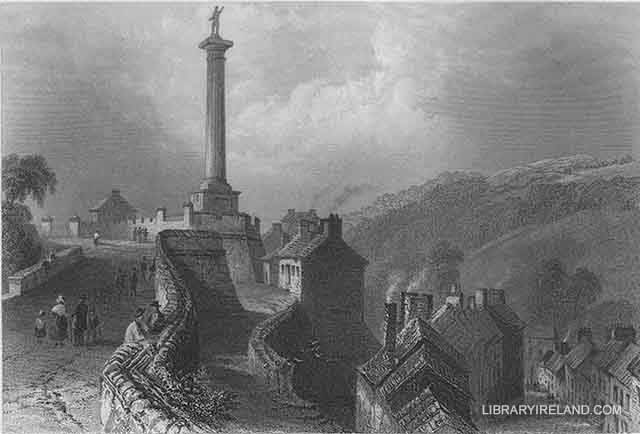Rev. George Walker's Pillar and the Walls of Derry
Early in the reign of James I., a considerable part of the province of Ulster was vested in the crown by the attainder of the Roman Catholic families of distinction, and a colonization of the forfeited estates was then suggested to the king by the lord-treasurer, Salisbury. His majesty, conceiving the city of London to be the best qualified to effect so great an object, on the 28th of January, 1609, permitted an agreement to be entered into between commissioners for the city and the lords of the privy council, whereby the towns and liberties of Derry and Coleraine, with the "salmon and eel fisheries of the rivers Bann and Foyle, and all other kind of fishing in the river Foyle, so far as the river floweth, and in the Bann to Lough Neagh, should belong in perpetuity to the city;" that the liberties of Londonderry should extend three miles every way; with numerous other privileges and conditions, included in twenty-seven articles of agreement. In 1613, the society of the new plantation of Ulster was incorporated; and from this date Derry has been the property of the city of London.
The walls of Derry are in high preservation, and form a most agreeable promenade of, perhaps, a mile in circumference. We walked round them in twenty minutes. There is no street beyond the exterior of the walls, but the houses are in many places backed against them. The view over the Foyle and the country beyond, from that part on which stands the PILLAR erected to the memory of the heroic clergyman, WALKER, is exceedingly fine. Walker's Pillar is a Doric column, eighty feet in height, and finished with a cupola, surmounted with a statue of the patriot, with his arm outstretched, the base of the column surrounded by the cannon used in the defence of the city. Derry is a clean and handsome town, with a general look of thrift and order. We saw no beggars in the streets, and no signs of the extreme poverty which disfigures the aspect of most towns in Ireland.

